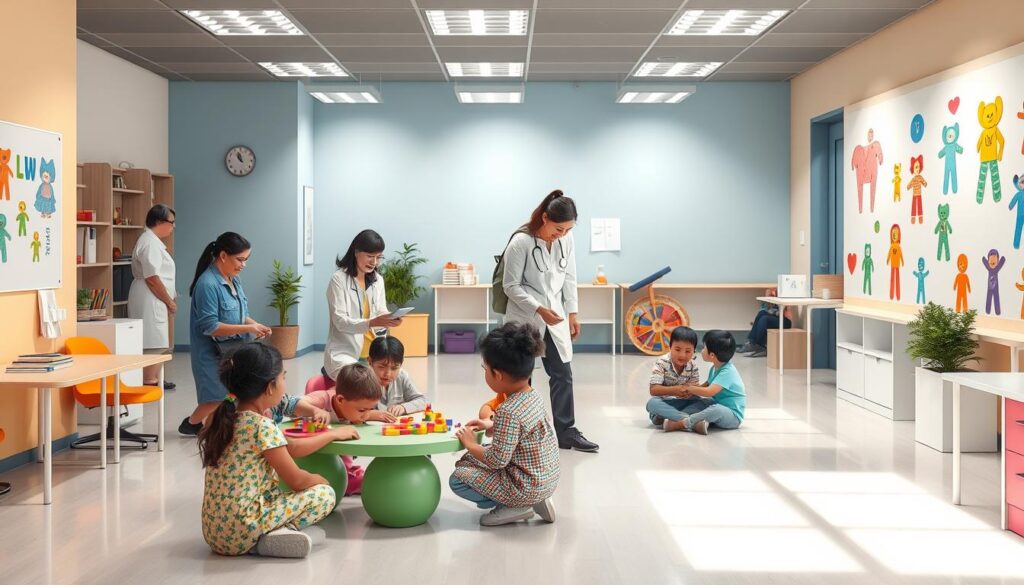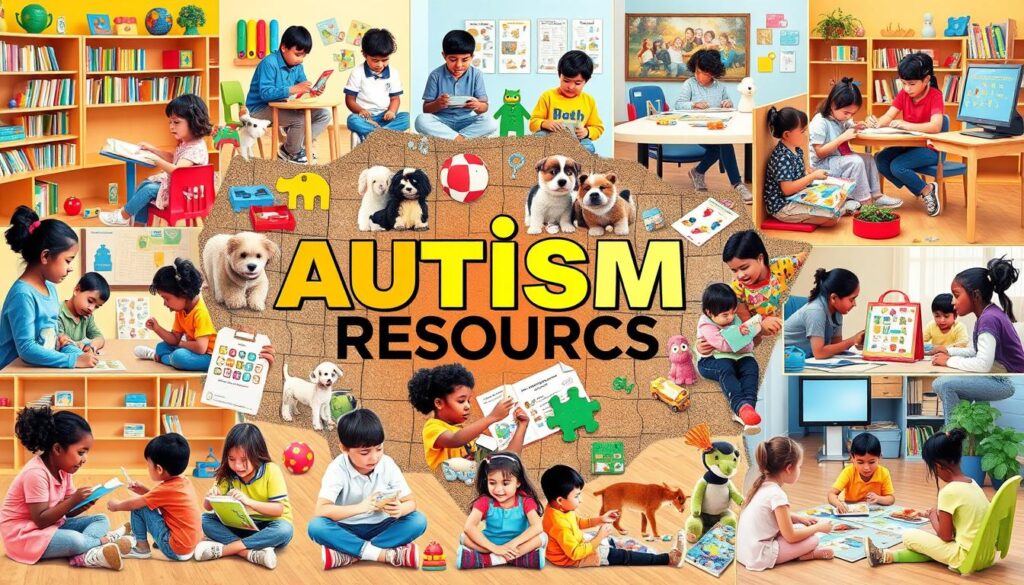Last Updated on: 31st January 2025, 02:25 pm
As discussions around autism continue to gain momentum, identifying the Best Countries for Autism support has become increasingly important. With approximately 1 in 36 children in the U.S. diagnosed with autism, the need for countries that prioritize autism-friendly nations is evident. These nations focus on critical aspects such as effective healthcare systems, quality education, and community support. In 2025, several countries stand out for their commitment to these vital autism resources, providing comprehensive environments that foster acceptance and growth for individuals with autism. Notably, countries like Austria, Mexico, India, Germany, the United States, Thailand, and Malaysia are recognized for their advancements in autism treatment, particularly through regenerative medicine.Discover more about the top nations offering specialized autism therapies1
Key Takeaways
- Many countries are enhancing their autism support systems through improved healthcare and community inclusion.
- Regenerative medicine treatments are becoming widely available in several leading nations.
- Accessibility to education and specialized resources plays a crucial role in supporting individuals with autism.
- States like Arizona have recognized autism-friendly cities to enhance family experiences.
- Therapeutic centers in countries like Mexico and India are effective and cost-efficient options for families seeking care.
Introduction to Autism Support Worldwide
Autism support systems are evolving across the globe, driven by a growing recognition of the needs of individuals with autism. Countries like Sweden have taken significant strides, emerging as the most autism-friendly nation due to exemplary healthcare and education services tailored for autism-specific requirements2. Australia follows closely, ranking fourth and excelling in research initiatives, early intervention programs, and autism-friendly public spaces2. Canada, positioned as the fifth most autism-friendly country, provides a wide array of autism resources to support individuals and families alike2.
The Global Autism Project plays a critical role in fostering global autism awareness, boasting over two decades of experience in enhancing autism services worldwide3. By partnering with organizations around the world, it aims to build sustainable support systems through comprehensive training programs designed with input from the Autistic community. Notably, their initiatives, including the Global Summit™ and SkillCorps® trips, seek to create collaborative networks for sharing knowledge and resources while addressing cultural sensitivities3.
In the United States, comprehensive services and support for individuals with autism have earned it the seventh position in terms of autism-friendliness2. New Zealand’s rank at ninth emphasizes the importance of accessible healthcare and support services2. By prioritizing autism support systems, these countries exemplify a collective responsibility to improve autism resources and ensure that individuals with autism can thrive in inclusive environments.
Factors Behind the Best Countries for Autism

Identifying the best countries for autism requires understanding several crucial factors, primarily centered around effective healthcare systems, tailored education opportunities, and robust community inclusivity. These elements lead to improved outcomes for individuals with autism and their families. Countries that prioritize autism healthcare often provide specialized services that make a significant difference in treatment access and effectiveness.
Healthcare Systems and Accessibility
Healthcare systems play a vital role in supporting individuals with autism. For example, the United States offers a wide range of resources and services for individuals with autism, including early intervention programs and specialized schools4. The National Disability Insurance Scheme (NDIS) in Australia ensures funding for therapies and services for individuals with autism, alleviating some financial burdens on families4. Sweden is acknowledged for its commitment to social integration, actively encouraging participation in community programs and activities4. These healthcare initiatives create a supportive environment that enhances the quality of life for individuals with autism.
Education Opportunities for Autism
Autism education is critical for fostering developmental skills in children with autism. Canada is recognized for offering inclusive education, allowing children with autism to attend mainstream schools equipped with specialized support4. In Europe, diagnosis of autism follows standardized criteria, and available support includes tailored educational programs and transition services5. Countries such as the United Kingdom provide comprehensive services for individuals through public healthcare, enhancing accessibility to educational resources and therapies4. Such educational frameworks are crucial for fostering successful outcomes for autistic individuals.
Community Inclusivity and Support Systems
Community inclusivity is a defining characteristic of autism-friendly countries. In Sweden, the government actively supports families with children with autism to ensure they can access necessary programs and services4. Socioeconomic factors contribute to varying levels of autism awareness and infrastructure across Europe, significantly impacting the available community support systems5. Enabling environments where individuals with autism are accepted and integrated is vital for their overall development and well-being.
Austria: A Leader in Autism Research and Treatment

Austria has gained recognition as a leader in autism research and treatment due to its commitment to innovative approaches. The integration of cutting-edge techniques has allowed researchers and practitioners to enhance autism treatment options. With an estimated 100,000 individuals with autism among the nation’s 9 million citizens, Austria acknowledges the growing need for effective support structures and treatment facilities6.
Innovative Approaches to Autism Treatment
Among the notable advancements in Austria’s autism treatment landscape is the pioneering research conducted at the Medical University of Vienna. This institution focuses on utilizing mesenchymal stem cells, which have shown promise in improving social communication and behavior for individuals with autism. Many specialized clinics report success rates for autism treatment ranging from 95% to 98%, placing Austria at the forefront of effective therapeutic interventions7.
Austrian Autism Support Organizations
Numerous Austrian autism support organizations provide vital resources to families and individuals affected by autism. These organizations strive to fill the gaps left by the current healthcare system, facing challenges such as long wait times—sometimes over six months for specialist evaluations and more than a year for behavioral program placements6. Furthermore, the country is working to address the deficit of child psychiatrists and improve access to services. Despite the obstacles, the dedication and support from local organizations offer hope and guidance to those navigating autism treatment and resources in Austria.
Mexico: Emerging Destinations for Autism Therapy

Mexico has rapidly gained recognition as a promising destination for autism therapy due to its advancements in regenerative medicine. Families seeking innovative treatments are increasingly turning to clinics offering stem cell therapy. These facilities provide not only specialized approaches but also personalized treatment plans tailored to the unique needs of each patient.
Regenerative Medicine Clinics in Mexico
The cost of stem cell therapy for autism in Mexico starts from $6,400, making it a more accessible option compared to other countries where the price can reach up to $19,000 in Germany and $12,000 in Ukraine8. Notable clinics such as Stem Health, Dr. Omar Gonzalez Integra Medical Center, Renue Medical Centre, MexStemCells, and Progencell have gained positive feedback from families experiencing significant improvements in symptoms8. The facilities typically require a length of stay of around 5 to 10 days, allowing families to efficiently manage their treatment schedules8.
Community Resources for Autism Families
In addition to receiving treatment, families benefit from a growing network of autism support in Mexico. National programs by nongovernmental associations focus on early detection and support for individuals with autism spectrum disorders. As the country addresses the increasing prevalence, the commitment to enhancing community resources is evident in the establishment of various facilities across Mexico9.
India: Advancements in Autism Treatments

India is rapidly emerging as a hub for autism treatments, showcasing a range of innovative therapies and services aimed at improving the quality of life for individuals with autism spectrum disorder (ASD). With ongoing research and clinical trials, the country is at the forefront of finding solutions for various aspects of autism.
Innovative Therapies and Affordable Care
Innovative therapies in India are significantly reshaping autism treatments. Applied Behavior Analysis (ABA) therapy is widely used, requiring intensive sessions of 25 to 40 hours a week, yielding positive effects on intellectual functioning and social skills10. Early intervention has proven to be critical, as studies show that starting therapies before the age of four can lead to substantial improvements in communication skills and adaptive behaviors11. Other emerging therapies include the Early Start Denver Model (ESDM), which offers a developmental approach suitable for children aged 12-48 months with ASD. Furthermore, speech and language therapy aims to enhance communication abilities, crucial for everyday interactions.
Indian Autism Support Networks
The establishment of Indian autism support networks has been instrumental for families seeking guidance and community support. These networks provide essential resources and information on autism treatments, connecting families with professionals in the field. Community-driven initiatives offer workshops, seminars, and group therapy sessions, contributing to a holistic environment for both children and caregivers. The collaborative efforts among healthcare providers, educators, and support groups reinforce India’s dedication to empowering families affected by autism, creating a nurturing atmosphere for growth and understanding.
Germany: Strong Autism Support and Education Systems

Germany is recognized for its robust autism support systems and quality autism education in Germany, which cater effectively to individuals with autism. With an inclusive definition of disabilities, the nation embraces a wide range of supports for neurodiverse children, ensuring they have access to essential therapies and education tailored to their needs. This commitment enhances not only educational outcomes but also the overall quality of life for these individuals.
Groundbreaking Research in Autism Treatments
Germany stands at the forefront of autism treatment research, having made significant advancements in therapeutic practices. According to a 2021 study, one in 68 children in Germany is diagnosed with an autism spectrum disorder, which aligns with global averages12. A notable aspect of research includes the provision of Applied Behavioral Analysis (ABA) therapy, which is effective for many neurodiverse kids12. The German government frequently incorporates ABA therapy into educational plans for children with autism, thereby facilitating access to quality services that support better integration into mainstream schooling12.
A comprehensive network of autism support exists across the nation, including tailored educational plans, therapies, and specialized schools designed for various disabilities12. Digital tools like Goally offer innovative solutions for teaching and therapy, helping children improve their communication skills and manage behaviors12. These resources not only foster academic growth but also promote life skills essential for independence.
In terms of educational frameworks, over 70% of learners with special educational needs (SEN) are integrated into mainstream early childhood education in Germany, with some regions reporting over 90%13. The inclusion of SEN learners in mainstream schools has significantly increased, demonstrating a commitment to inclusive education practices13. Regional differences exist, yet parents enjoy the flexibility of selecting the appropriate school for their children, regardless of disabilities13.
| Aspect | Details |
|---|---|
| Diagnosis Rate | 1 in 68 children diagnosed with autism spectrum disorder |
| ABA Therapy | Incorporated into educational plans for autism |
| SEN Inclusion | Over 70% of SEN learners in mainstream early childhood education |
| Parental Choice | Parents can choose schools for their children with disabilities |
| Educational Variety | 261 types of courses for students with disabilities |
United States: Diverse Autism Resources

The United States stands out as a hub for autism resources, offering a wide array of options for individuals and families. The nation boasts some of the leading autism treatment centers globally, ensuring quality care and support. Organizations like the Autism Science Foundation and Simons Foundation Autism Research Initiative are dedicated to enhancing research and advocacy efforts for those on the spectrum14. These centers focus on evidence-based treatments and provide ongoing clinical trials to explore innovative therapy modalities, including regenerative medicine15.
Leading Autism Treatment Centers
Among the various autism treatment centers, the Southwest Autism Research and Resource Center (SARRC) is prominent, emphasizing education and community outreach. Additionally, programs addressing early identification of autism symptoms are actively promoted through initiatives like Learn The Signs. Act Early, established with support from the CDC15. These resources collectively contribute to effective response mechanisms for autism-related challenges.
Employment Opportunities for Individuals with Autism
Employment opportunities for autism are expanding, with numerous organizations advocating for inclusive workplace environments. The National Association of Councils on Developmental Disabilities focuses on establishing policies that enhance job placements for individuals with disabilities14. Such initiatives aim to create lasting connections between service members and the workforce, illustrating a commitment to inclusivity across various sectors. Research via the IES further supports employment strategies tailored for autistic individuals, ensuring they receive equitable opportunities in professional settings15.
Thailand: Family-Friendly Autism Care
Thailand is highly regarded for its welcoming environment and specialized centers that provide excellent autism treatment in Thailand. Notable establishments like CARE (Center for Autism Recovery and Education) focus on holistic care by offering programs based on Applied Behavior Analysis (ABA) principles, ensuring that families receive personalized support tailored to their specific needs16. In addition, St Andrews International School Bangkok exemplifies a strong commitment to inclusive education with a non-selective admissions process, allowing children on the Autism spectrum to thrive16.
In vibrant Bangkok, a variety of schools and learning support centers offer valuable services designed for children with autism. Parents can also benefit from resources provided by organizations such as Autism Speaks, which is known globally for its dedication to improving the lives of individuals with autism16. Websites like bkkkids.com and merakilane.com compile extensive lists of autism support resources, making it easier for families to access the help they need.
The family-friendly autism care ethos in Thailand is evident through the community’s commitment to supporting caregivers and individuals on their healing journey. Engaging activities and understanding environments can be found throughout the country, fostering not just therapeutic growth but also enriching family experiences for vacations that cater to autistic. With its array of services and support systems, Thailand stands out as a prime destination for those seeking comprehensive autism care16.
FAQ
What are the best countries for autism in 2025?
What makes a country autism-friendly?
How do countries support autism education?
What types of healthcare services are available for autism?
What role do support organizations play in autism care?
Are there employment opportunities for individuals with autism?
How does community inclusivity affect individuals with autism?
What advancements are being made in autism research?
How accessible are autism resources in these countries?
Source Links
- https://brainwave.watch/autism-friendly-countries/
- https://fsautismcen.org/2023/10/29/ranking-the-most-autism-friendly-countries-in-the-world/
- https://www.globalautismproject.org/
- https://www.magazine.medicaltourism.com/article/best-country-for-autism-disorders-treatment
- https://www.abtaba.com/blog/autism-in-europe
- https://www.thetransmitter.org/spectrum/austria-can-restore-status-center-autism-research/
- https://amedical.az/en/blog/238-autism-treatment-abroad.html
- https://globalstemcelltherapy.com/stem-cell-packages/autism-stem-cell-treatment-mexico/
- https://link.springer.com/doi/10.1007/978-1-4614-4788-7_162
- https://www.medicoexperts.com/autism-treatment-in-india/
- https://www.discoveryaba.com/aba-therapy/best-treatment-for-autism-in-the-world
- https://getgoally.com/blog/autism-schools-in-germany-parent-guide/
- https://www.european-agency.org/country-information/germany/systems-of-support-and-specialist-provision
- https://iacc.hhs.gov/resources/organizations/private/
- https://iacc.hhs.gov/resources/organizations/federal/
- https://www.bkkkids.com/blog/finding-support-for-children-with-autism/

As a passionate, global-thinking Real Estate Investor I am constantly looking for the best opportunities to invest in Properties. With Aparthotel.com I am building an All-In-One Global Real Estate Platform, where people can analyse, rent or invest in properties. Additionally I help Investors with comparing the best financing options as well as give detailed Consultation on the buying process for Real Estate Investments around the world. I am looking forward to sharing my knowledge on this Website and feel free to reach out to me if you have any questions.

Comments